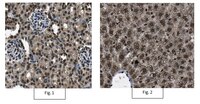UTF1, a novel transcriptional coactivator expressed in pluripotent embryonic stem cells and extra-embryonic cells.
Okuda, A; Fukushima, A; Nishimoto, M; Orimo, A; Yamagishi, T; Nabeshima, Y; Kuro-o, M; Nabeshima, Yi; Boon, K; Keaveney, M; Stunnenberg, HG; Muramatsu, M
The EMBO journal
17
2019-32
1998
Show Abstract
We have obtained a novel transcriptional cofactor, termed undifferentiated embryonic cell transcription factor 1 (UTF1), from F9 embryonic carcinoma (EC) cells. This protein is expressed in EC and embryonic stem cells, as well as in germ line tissues, but could not be detected in any of the other adult mouse tissues tested. Furthermore, when EC cells are induced to differentiate, UTF1 expression is rapidly extinguished. In normal mouse embryos, UTF1 mRNA is present in the inner cell mass, the primitive ectoderm and the extra-embryonic tissues. During the primitive streak stage, the induction of mesodermal cells is accompanied by the down-regulation of UTF1 in the primitive ectoderm. However, its expression is maintained for up to 13.5 days post-coitum in the extra-embryonic tissue. Functionally, UTF1 boosts the level of transcription of the adenovirus E2A promoter. However, unlike the pluripotent cell-specific E1A-like activity, which requires the E2F sites of the E2A promoter for increased transcriptional activation, UTF1-mediated activation is dependent on the upstream ATF site of this promoter. This result indicates that UTF1 is not a major component of the E1A-like activity present in pluripotent embryonic cells. Further analyses revealed that UTF1 interacts not only with the activation domain of ATF-2, but also with the TFIID complex in vivo. Thus, UTF1 displays many of the hallmark characteristics expected for a tissue-specific transcriptional coactivator that works in early embryogenesis. | 9524124
 |









